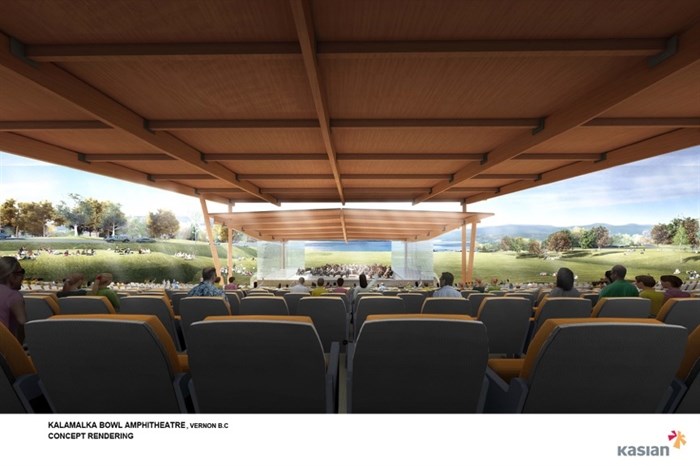
Artist's rendering of the proposed amphitheatre at Okanagan College.
Image Credit: Okanagan Summer Festival Society
March 18, 2016 - 9:00 PM
VERNON - Proponents of an outdoor amphitheatre at Okanagan College are hopeful solutions can be found to alleviate the concerns of local residents.
The Okanagan Summer Festival Society announced plans for the amphitheatre, which would accommodate 1,500 people plus an additional 4000 in grass seating, in December 2015. But the idea isn’t going over well with neighbouring residents like Joan Rowan, who says noise and environmental issues are the main concerns.
“The location is in the middle of a residential area,” Rowan says. “We hope to, and we will, convince them this is just the wrong location. Good idea, wrong location.”
The festival society anticipates concerts would be held at the amphitheatre for three to four weeks in July and August with two to three events were week. Other events would also be scheduled for local groups and touring artists.
Rowan says the noise pollution would interfere with her, and other property owners’, enjoyment of their homes during the concert season. She says a recent meeting was attended by about 100 people who do not want to see the amphitheatre built at the college, even though the society has said it will conduct sound tests on the site.
“It would be impossible for any noise engineer to test accurately for crowd noise combined with performers’ noise, combined with traffic noise, which are all affected by weather conditions, such as wind. There’s something called 'valley wave echo' which must be what carries Funtastic’s noise across the lake,” Rowan says. “Maybe they (performers) are told you can’t go above such and such a volume, but certain types of groups they like it loud and they’ll do that and there will be complaints after the fact.”
In addition to noise, Rowan says the main concerns are environmental impacts on the gully, drainage problems, traffic and parking issues, and loss of green space for wildlife.
“You can see the erosion when they built the community gardens not too long ago. They had to do a lot of work on drainage and there are still problems,” Rowan says.
Okanagan Summer Festival Society managing director Diane Bond says they expected noise concerns might arise, and are doing their homework to minimize the impact on neighbours.
“We’re in the sound business, that’s what we always think of first. And so, we did anticipate there would be concerns. To deal with that issue, we have been in the process of taking bids from acoustical engineering firms, and work they would do for us beginning this summer would be to do initial noise testing at the site.”
Preliminary discussions with engineers suggest the topography and natural sound barriers would significantly limit how far the sound carries, Bond says.
As funding becomes available, the society also intends to complete a full list of environmental studies on the site, she says.
“It’s been pointed out to us by many people because of how the gullies were formed by flowing water, this is an important considerations and so we’re certainly expecting to deal with that. It will require various expertise in hydrological and geotechnical work,” Bond says.
The society has signed a Memorandum of Understanding with Okanagan College that authorizes it to move forward on developing the idea. Dean Jane Lister turned down an interview request for this story, but has previously said the college expects all funding arrangements, and due diligence, including consultation with neighbours, the municiaplity and First Nations, as well as engineering and environmental studies, will be in place before a final agreement is signed.
The public is invited to an upcoming open house Tuesday, March 22 at the Kal View Room at Okanagan College from 5 p.m. to 7 p.m. to find out more about the proposal.
“We hope it will be a constructive discussion focussed on finding solutions,” Bond says.
She adds the actual construction of the amphitheatre isn't expected to take long, it's the process of getting there that could take years. Because the society is a charity, it will have to rely on donations and grants to pay for all the required studies and assessments.
"We know we have to go through all these processes before the shovel hits the ground and we don’t know how long it’s going to take to get to that point,” Bond says. “I’ve taken to telling people it needs to be done in my lifetime.”
You can find more information, and provide feedback, here.
To contact a reporter for this story, email Charlotte Helston at chelston@infonews.ca or call 250-309-5230. To contact the editor, email mjones@infonews.ca or call 250-718-2724.
News from © iNFOnews, 2016